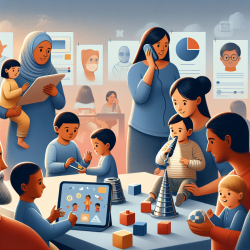Introduction
Unilateral vocal cord paralysis (UVCP) in children is a significant concern, particularly when it arises as an iatrogenic complication following cardiac surgery. The recent review article, "Iatrogenic Pediatric Unilateral Vocal Cord Paralysis after Cardiac Surgery: A Review," provides critical insights that can enhance the practice of speech-language pathologists (SLPs) working with this population. This blog explores the key findings from the review and suggests practical ways for practitioners to integrate these insights into their clinical practice.
Understanding UVCP and Its Implications
UVCP occurs when one vocal cord loses its ability to move due to nerve damage, often resulting from surgical procedures. This condition can lead to various symptoms, including dysphonia (voice problems), aspiration, and swallowing difficulties. The review highlights that the most common cause of UVCP in pediatric patients is iatrogenic injury to the recurrent laryngeal nerve (RLN) during cardiac surgeries, particularly patent ductus arteriosus (PDA) ligation.
Key Findings from the Review
The review underscores several critical points:
- Prevalence and Diagnosis: The prevalence of UVCP varies widely due to inconsistent diagnostic criteria and reporting methods. Flexible laryngoscopy is the gold standard for diagnosing UVCP, yet its use is not uniform across studies.
- Symptom Burden: Dysphonia is the most commonly reported symptom, followed by aspiration and swallowing difficulties. However, the symptom burden is often underreported due to a lack of standardized assessment tools.
- Surgical Interventions: Various surgical techniques, including injection medialization (IM), thyroplasty, and recurrent laryngeal nerve reinnervation (RLNR), are used to treat UVCP. However, there is limited data on the long-term outcomes of these interventions in children.
- Need for Standardization: The review calls for standardized protocols for diagnosing, treating, and evaluating UVCP to improve the consistency and reliability of research findings and clinical outcomes.
Implementing Research Findings in Clinical Practice
SLPs can leverage these findings to enhance their practice in several ways:
- Adopt Standardized Diagnostic Tools: Utilizing flexible laryngoscopy and validated assessment tools such as the Pediatric Voice-Related Quality of Life (PVRQOL) survey can help ensure consistent and accurate diagnosis of UVCP.
- Comprehensive Symptom Assessment: Implementing both subjective (e.g., parent-reported questionnaires) and objective (e.g., acoustic analysis) measures can provide a holistic view of the child's symptom burden, aiding in more tailored intervention plans.
- Collaborative Care: Working closely with otolaryngologists and other healthcare providers can facilitate timely and appropriate surgical interventions when necessary. Early identification and intervention are crucial for better long-term outcomes.
- Advocate for Research and Standardization: Engaging in and supporting research efforts to standardize diagnostic and treatment protocols can contribute to the broader knowledge base and improve care for all children with UVCP.
Encouraging Further Research
The review highlights significant gaps in the current understanding of UVCP, particularly regarding the natural history of the condition and the long-term outcomes of various treatments. Practitioners are encouraged to contribute to research efforts by:
- Participating in Clinical Studies: Engaging in research studies can provide valuable data that help refine diagnostic and treatment protocols.
- Documenting Clinical Outcomes: Systematically recording and sharing clinical outcomes can help build a more robust evidence base for effective interventions.
- Collaborating with Researchers: Partnering with academic institutions and research organizations can facilitate the development of comprehensive studies that address current knowledge gaps.
Conclusion
By integrating the insights from the review article into clinical practice, SLPs can improve the diagnosis, treatment, and long-term outcomes for children with UVCP. Emphasizing standardized diagnostic tools, comprehensive symptom assessment, collaborative care, and active participation in research can lead to better care and enhanced quality of life for these young patients.
To read the original research paper, please follow this link: Iatrogenic pediatric unilateral vocal cord paralysis after cardiac surgery: a review.










